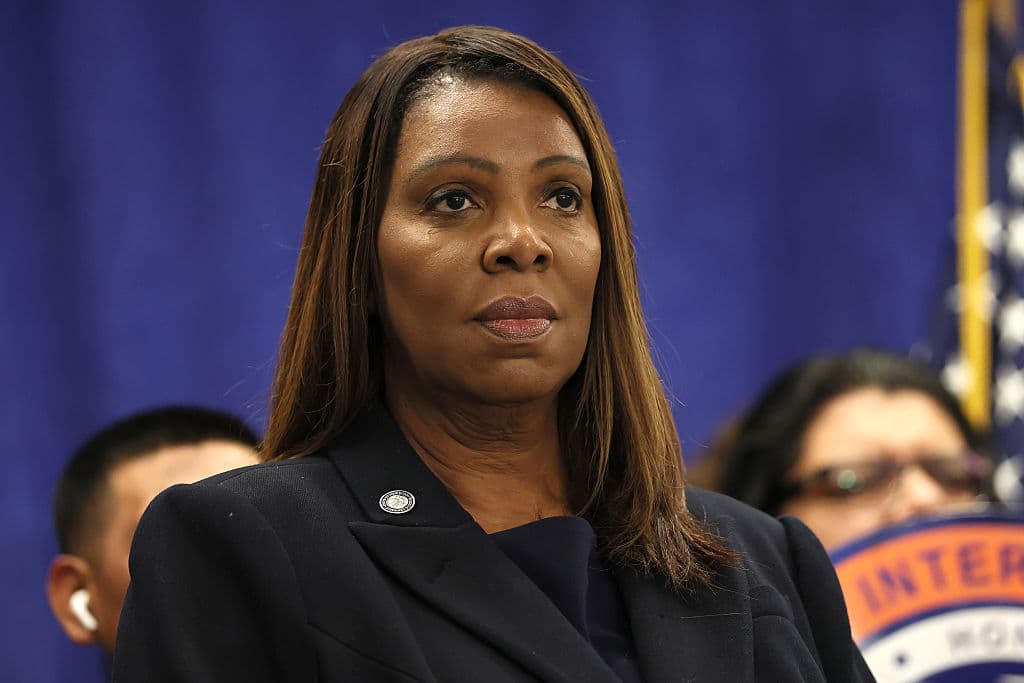‘There Is No Fear’: Letitia James Pleads ‘Not Guilty’ to Fraud, Denounces Trump for ‘Weaponization,’ in Remarkable Reversal of Roles
New York’s attorney general is planning a strategy that closely tracks the one adopted by James Comey.

The arraignment of New York’s attorney general, Letitia James, at a Virginia federal courtroom on charges of mortgage fraud marks a vertiginous reversal for the prosecutor turned criminal defendant. She now faces a felony trial, to begin on January 26.
Ms. James entered a plea of “not guilty, judge” to one count of bank fraud and one count of making false statements to a financial institution. The indictment against her contends that she falsely claimed that a home at Norfolk was her second residence in order to obtain a $100,000 loan. She is also accused of having rented the property to a family of three.
The newly minted criminal defendant, though, argues that her grandniece has been living at the property since 2020. Ms. James represents that she has collected only $1,350 in rent from the property. That could undercut the government’s argument that she was using the property as a revenue source.
Ms. James declares that the charges against her are “baseless” and that President Trump’s “own public statements make clear that his only goal is political retribution at any cost.” Her attorney, Abbe Lowell, has denounced the case against his client as “threadbare” and “cherry-picked.” The case will be heard by Judge Jamar Walker, an appointee of President Biden. Ms. James was released with no conditions placed on her bail.
Ms. James, speaking outside of the courthouse after her arraignment, declared, “I have this belief in the justice system and the rule of law. There is no fear.” She added: “This is not about me. This is about all of us and a weaponized justice system, this justice system which has been used as a tool of revenge.”
Mr. Trump has said in respect of the case against one of his most formidable foes: “I look at the facts like everybody else. You read the facts, and to me she looks terrible, she looks like she’s very guilty, but that’s going to be up to the DOJ.” He has also reckoned, “It looks to me like she is very guilty of something, but I really don’t know.”
The lead prosecutor on the case is Lindsey Halligan, the acting United States attorney for the Eastern District of Virginia. Before being appointed to that prestigious post, she was a member of Mr. Trump’s personal defense team in the Mar-a-Lago case and was most recently a White House aide tasked with re-balancing the ideological tone of the Smithsonian museums.
The circumstances by which Ms. Halligan were thrust into the spotlight, though, could thwart the Department of Justice’s ambition to convict Ms. James. Ms. Halligan replaced the previous interim United States attorney, Erik Siebert, who resigned under pressure after Mr. Trump said he should go because he enjoyed the support of Virginia’s two Democratic senators. ABC News reported that Mr. Siebert was refusing to pursue cases against Ms. James or a former director of the FBI, James Comey, who was also indicted by Ms. Halligan.
Now both of those prosecutions belong to Ms. Halligan. Mr. Comey, who is charged with lying to Congress, has already challenged her appointment as unlawful, and Ms. James has docketed paperwork that she intends to do the same. The crux of the case for disqualification is that federal statute bars the president from appointing two consecutive interim United States attorneys — here Mr. Siebert and Ms Halligan — for 120-day terms.
That position was taken in a 1986 memorandum authored by the then deputy assistant attorney general, Samuel Alito. Mr. Comey also cites the disqualification of Special Counsel Jack Smith from the Mar-a-Lago case against Mr. Trump as precedent for judges looking at appointed prosecutors with gimlet eyes. Mr. Comey is also challenging Ms. Halligan’s prosecution as “selective” and “vindictive,” a strategy that Ms. James is likely to adopt as well.
Mr. Lowell also asked Judge Walker to prevent Ms. Halligan from making extrajudicial comments about the case. That came after Ms. Halligan engaged in a correspondence on Signal with a reporter, Anne Brower, for Lawfare. Mr. Lowell argues: “These extrajudicial statements and prejudicial disclosures by any prosecutor, let alone one purporting to be the U.S. attorney, run afoul of and violate the federal rules of criminal procedure.”
Mr. Trump and Ms. James have long locked horns. She ran for office in 2018 vowing to “shine a bright light” into his real estate dealings, and in 2024 secured a gargantuan civil fraud judgment against him, his two adult sons, and their family business. That penalty eventually ballooned to more than $500 million before it was overturned as a violation of the Constitution’s prohibition of “excessive fines.”
Both Mr. Trump and Ms. James have appealed that verdict, which left the underlying finding of fraud intact. The final word on the case will belong to the New York court of appeals, the state’s highest tribunal.

